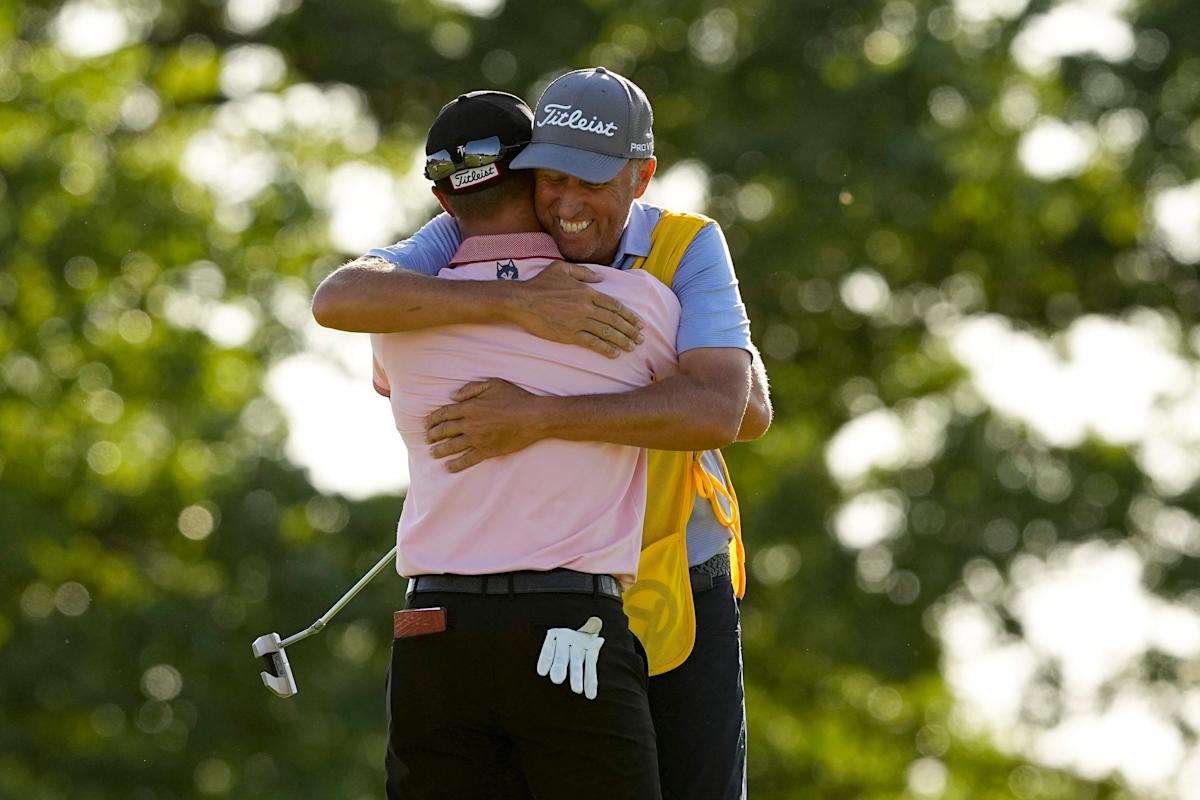
TULSA, Okla. (AP) — The morning after was like any other after a week’s work as a caddie, with one exception.
Jim “Bones” Mackay finished his laundry, packed his car and began the four-hour drive from Southern Hills to Colonial, this time with a special souvenir riding shotgun.
He has been on the bag for six majors. This was the first time he left the golf course with the pin flag from the 18th hole, where Justin Thomas rapped in the final par putt to capture the PGA Championship in a three-hole playoff.
The tradition is for the caddie to get the flag — his trophy — except that Phil Mickelson had his own tradition of flags going on the kitchen wall of his late grandfather, starting with his first PGA Tour title he won as an amateur.
Mackay prefers not to talk about his 25 years with Mickelson. They parted in 2017, and the caddie traded a 40-pound golf bag for a microphone when he worked for NBC. His passion was to caddie, however, and he once said only two players would interest him. One was Thomas. He didn’t reveal the other out of privacy.
While that yellow flag is meaningful — the number “18” on the right, bold letters of “PGA” on the left beneath the pink clock tower at Southern Hills — the experience brings its own set of memories that won’t go on a wall.
“Just amazing. It’s so hard to put into words,” Mackay said as he drove to Fort Worth, Texas, where Thomas is playing the Charles Schwab Challenge. “There’s just this incredible sense of joy and literally happiness for Justin. I just like him so much as a person.”
The feeling is mutual, and that much was evident on Saturday evening after it looked as though Thomas had put himself too far behind with a 74 in the third round, a score Mackay felt was worse than it really was.
“I just needed to let off some steam,” Thomas said.
It wasn’t the first time Thomas did that at Southern Hills. He spoke of a terse exchange Wednesday with his father, longtime PGA professional Mike Thomas, as he was getting increasingly frustrated with how he was hitting it.
“I think as a dad he doesn’t want to … he’s not going to go full Butch Harmon or Pete Cowen and tell me I suck or ‘That’s not very good,’ or whatever it is. And sometimes I would love for him to say that just because I want to hear it,” Thomas said. “You need that accountability.”
He opened with a 67-67 in the worst of the wind, the wrong side of the draw. And then came the 74 and a late-evening visit to the range and a chat with his caddie.
“The gist of it was he had this very unusual round on Saturday,” Mackay said. “He played well, but the score added to a 74. We went down to practice, and just us talking collectively, I said: ‘There’s nothing to work on. Things didn’t fall into place.’ Nine times out of 10, he shoots 70. This one added to a 74.”
The underlying message was not to fix what wasn’t broken. Sure, frustration was building from having gone 14 months and 28 tournaments around the world without winning. But the game was there. He just needed a few things to go right.
They did, and it went wrong for so many others, most notably Mito Pereira, who needed a par on the final hole to win, hit his tee shot into the stream and made double bogey.
Given a second chance, Thomas seized on the moment against Will Zalatoris. In the four previous PGA playoffs since it went to a three-hole aggregate format, no one had ever birdied the first two holes until Thomas hit a wedge to 6 feet on the par-5 13th and a 3-wood onto the green at the 301-yard 17th, the signature shot of his win.
He played the final 13 holes, including the playoff, with six birdies and seven pars. The comeback victory tied a PGA Championship record set by John Mahaffey in 1978 at Oakmont.
The rally might have started Saturday night.
“I’m fully confident in saying that I wouldn’t be standing here if he didn’t give me that … wasn’t necessarily a speech, but a talk, if you will,” Thomas said, the Wanamaker Trophy at his side.
“I played pretty well yesterday for shooting 4 over, and I felt like I’d played terrible. And he was just like, ‘Dude, you’ve got to stop being so hard on yourself. You’re in contention every single week we’re playing.’ I’ve had a lot of chances to win tournaments, and it’s a hard golf course; it’s a major championship. You don’t have to be perfect.”
Thomas said he left in an “awesome frame of mind.” They were the last ones on the range. It was twilight in the sky yet it felt like sunrise between the ears.
That peace carried into Monday.
Thomas had the Wanamaker Trophy and was tweeting about his shank on the par-3 sixth and the greatest bogey he ever made. Mackay had the 18th flag in his car.
“I never realized southern Oklahoma was so beautiful,” Mackay said as he drove to the next destination.
___
More AP golf: https://apnews.com/hub/golf and https://twitter.com/AP_Sports
